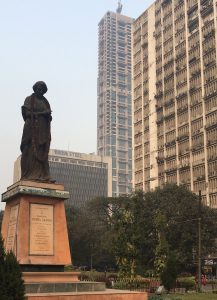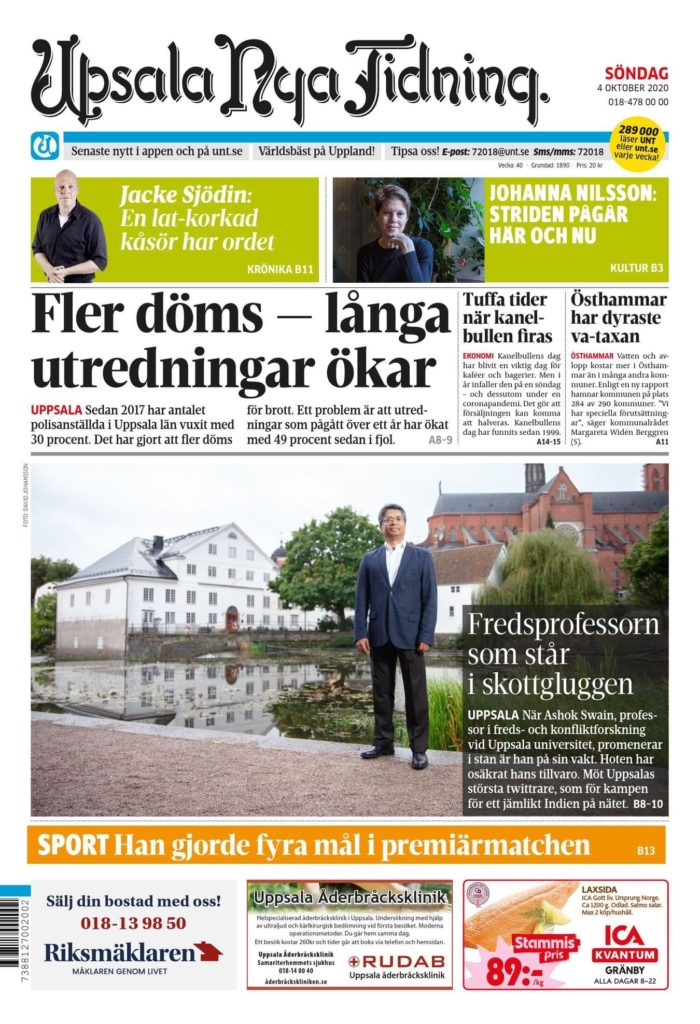History of the SASNET network 2001-2016, in SÜDASIEN
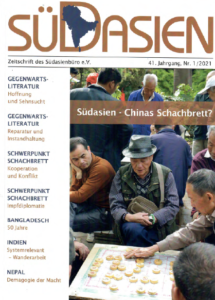 In its 2021 No.1 issue, the eminent German magazine SÜDASIEN published an article on the History of SASNET, written by me (Lars Eklund), but translated into German language. The title is ”SASNET auf Abwegen. Bilanz eines schwedischen Südasien-Netzwerks” (SASNET gone astray. A balance sheet of a Swedish South Asia network).
In its 2021 No.1 issue, the eminent German magazine SÜDASIEN published an article on the History of SASNET, written by me (Lars Eklund), but translated into German language. The title is ”SASNET auf Abwegen. Bilanz eines schwedischen Südasien-Netzwerks” (SASNET gone astray. A balance sheet of a Swedish South Asia network).
Go for the article.
In the previous issue of SÜDASIEN, No. 4/2020, a presentation of the Swedish magazine SYDASIEN was given by the editors Johan Mikaelsson and Henrik Schedin. The magazine for which I was the editor in chief during the period 1982 til 2007 is now again a vibrant print magazine. Go for the text.
Support The Quint and Caravan!
SASNET History 2000-2016

Go for Lars Eklund’ s document on the old SASNET (2000-2016) – a unique feature being a national all-Swedish research and information network, not found elsewhere in the World. It was built up by Staffan Lindberg and Lars Eklund in 2001, and within a few years became an internationally highly recognised network connecting all Swedish and Nordic researchers in the field of South Asian studies.
However, from January 2017 SASNET was transformed into a local research centre, keeping the network name but in reality being a completely different institution than the ”old” SASNET.
2019-20 Lund International Tagore Choir tour to Bangladesh

Thursday 26 December 2019:
Flying from Copenhagen at 18.50 to Kolkata, via Delhi, and onwards to Dhaka for a two weeks tour in Bangladesh, with performances in Dhaka, Jessore, Kushtia and Sylhet.
 Time 18.20, half an hour before boarding the Air India flight for Delhi. Little tired after hectic planning for the Bangladesh tour and changes in the programme being made even yesterday. Bubu and I travel with Staffan who will be with us not only in Bangladesh but also afterwards two weeks in India.
Time 18.20, half an hour before boarding the Air India flight for Delhi. Little tired after hectic planning for the Bangladesh tour and changes in the programme being made even yesterday. Bubu and I travel with Staffan who will be with us not only in Bangladesh but also afterwards two weeks in India.
The rest of the choir travels by British airways tomorrow, and we will meet in Dhaka.
Friday 27 December:
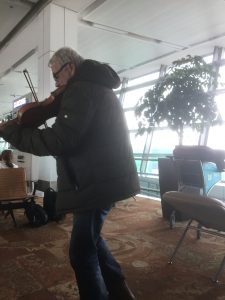 Delhi airport, time is 14.45, arrived here at 07.30 and we were supposed to continue for Kolkata at 14.00 but flight is rescheduled for 16.30. However, after long rest and light lunch at Food Court, Staffan happened to find a sweet Bengali student on her way back to Kolkata from a masters study in Nottingham, UK. Staffan played his violin and we are now invited to Attree’s family house in Salt Lake.
Delhi airport, time is 14.45, arrived here at 07.30 and we were supposed to continue for Kolkata at 14.00 but flight is rescheduled for 16.30. However, after long rest and light lunch at Food Court, Staffan happened to find a sweet Bengali student on her way back to Kolkata from a masters study in Nottingham, UK. Staffan played his violin and we are now invited to Attree’s family house in Salt Lake.
 Finally arrived Kolkata at 7 pm, only to find that we had to wait in an enormous queue for immigration, OCIs like Bubu and me are now put together with ordinary Indian citizens. Reached our residence at 9,30, warmly welcomed by Rana and Boni. Staffan enthusiastic about the environment and opened the Jägermeister bottle he bought in Delhi.
Finally arrived Kolkata at 7 pm, only to find that we had to wait in an enormous queue for immigration, OCIs like Bubu and me are now put together with ordinary Indian citizens. Reached our residence at 9,30, warmly welcomed by Rana and Boni. Staffan enthusiastic about the environment and opened the Jägermeister bottle he bought in Delhi.
Saturday 28 December: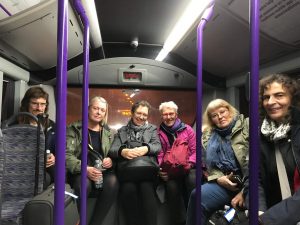
Woke up at 06.30, found a message from the big choir group that they are now on their way, see the nice photo from London. We meet in Dhaka this Evening.
Stay at Ambala Inn Hotel, plot 39, Road 2, Dhanmondi.
Staffan and I took a walk around Lake Market and down to the Lakes, the oasis area close to our Kolkata residence, and after lunch the three of us took a taxi for the airport, arriving at 2 PM, in due time for the 16.10 Indigo flight to Dhaka.
 At Dhaka airport we immediately found Sheila, who waited for us to fill in the immigration cards correctly. The rest of the choir had already got out to fetch their luggage and change money. And outside we were greeted by our friends Menal and Gulubhai plus our Bangladeshi choir member Alfi and her husband Arman.
At Dhaka airport we immediately found Sheila, who waited for us to fill in the immigration cards correctly. The rest of the choir had already got out to fetch their luggage and change money. And outside we were greeted by our friends Menal and Gulubhai plus our Bangladeshi choir member Alfi and her husband Arman.
Out into the chaotic traffic, waiting for the two pre-ordered minibuses, one for the nine Swedes, and the second for our bags. Constant traffic jam, it took 1,5 hours to reach the hotel, but we enjoyed being together full of interesting conversations. And after checking in at the nice hotel in one of the best areas of Dhaka, Alfi and Arman showed us the way to a food court nearby with restaurants serving lots of different food.
Sunday 29 December:
Zainul Festival in Dhaka, choir perform at 16.00. Finally news about the festival in Internet, the festival is held in commemoration of Zainul Abedin, who was a pioneer in Art Education in Bangladesh. We had a rehearsal in the morning at our hotel, and now look forward ro our first Bangladesh performance. The next will be in Jessore on 1 January.
Nice to be back at Dhaka University an its wonderfully green and peaceful campus, last time I and Bubu were there was in 2015 on invitation by Mashiur Rahman, at that time Professor of Sociology (now is Pro Vice Chancellor at National University, where we will ge go later), meeting the students and also had a formal meeting with the then DU Vice Chancellor. Previously I have also visited Dhaka University twice on SASNET missions, both in 2002 and 2005.
Our mini-concert consisting of five beautiful Tagore songs was held at the Faculty of Fine Arts (the Arts College) for a large audience who seemed to appreciate our performance greatly. Afterwards we met many people who liked to discuss our performance, and one lady said that our Bengali pronunciation was perfect, fantastic!
After our performance came several other music programmes, including strong Baul singing, of a kind we hope to experience more in depth when we visit Kushtia and Lalon Fakir’s grave next week.
Monday 30 December:
Second day of Choir Bangladesh tour, 30 december 2019. Summary from later. Visit to Dhaka University with Rifat Rahman and his colleague from Rabindra University. Rifat has studied archaeology at Lund University and is a close friend to us. He came to our hotel and met our group and we discussed history and society of Bangladesh, since he and colleague now works in a department of Cultural Heritage and Bangladeshi studies.
After lunch we went on tour to Dhaka University and visited several departments and also the university museum, with interesting artifacts.
A tour to Old Dhaka had to be cancelled due to heavy traffic, and the fact that we were invited to dinner at a great restaurant in the evening by our Bangladeshi choir member Alfi and her husband Arman Ahamed Subash, so we needed to take some rest inbetwen.
It was a buffet dinner with lots and lots of dishes, and we met the family members of our hosts. Nice evening and before leaving we sang together and Staffan played his violin much to the delight of the restaurant staff.
Tuesday 31 December:
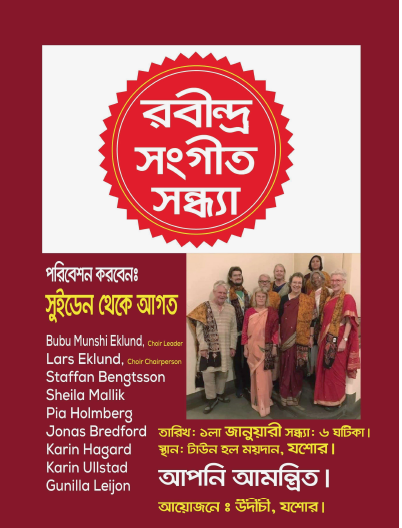 New Year’s Eve in Jessore. Third day of Tagore driver’s Bangladesh tour, early departure with comfortable Volvo bus from Dhaka, ferry crossing over Padma River (ie Ganges with renamed border with India) and arrival in charming small town of Jessore where posters are posted all over town about our concert on the Uddichi stage tomorrow at 5.30 pm.
New Year’s Eve in Jessore. Third day of Tagore driver’s Bangladesh tour, early departure with comfortable Volvo bus from Dhaka, ferry crossing over Padma River (ie Ganges with renamed border with India) and arrival in charming small town of Jessore where posters are posted all over town about our concert on the Uddichi stage tomorrow at 5.30 pm.
Warmly welcomed by our choir member Momota’s family who generously accommodates half the gang while me and a few others stay at the Plaza Hotel.
Offered on wonderful Hilsa fish in mustard oil sauce, and the evening spent with super talented local musicians and exciting Bengali musical theater. Where our ladies got to participate in an inauguration ritual whereby everyone sang Tagore’s wonderful song Anandaloka mongolaloke. We who can sing the song of course. See photos.
Wednesday 1 January 2020:
Fourth day of the Tagore choirs Bangladesh tour. Such a great day.with a well-organised concert at Uddichi cultural centre in Jessore for a crowded and enthusiastic audience, listening to our general programme including both Tagore songs and some Swedish tunes. Posters have been all over town since weeks, and people we met during the day were anxious to know when the programme should start exactly. And all newspapers and local TV were there making interviews, aleady published in the papers web editions, and tomorrow we will appear in TV.
What a delightful contrast to the first concert at Dhaka University. With no publicity at all, and with a minimum of efforts by the organisers to promote our performance and draw an audience.
Add to this an excellent stay by Momotas family with delicious home made food and a warm atmosphere here in Jessore. Thanks for that.
Finally, we were happy with our singing at the concert. Great work by all members, and excellent solo songs by Bubu, Karin and myself (Tiggaren från Luossa, Dan Anderssons song so much influenced by Tagore).
Tomorrow we head for Kushtia.
Thursday 2 January
Only a few hours by road from Jessore to Kolkata – Bubu’s ancestral home is actually located close to Jessore Road in north Kolkata. But such difference there is between Bangladesh and neighboring India with the latter country’s modernity, English language proficiency, and a political debate right now focusing on the controversial new law on immigration and the countrywide protests against it. Compare with the situation here where the poverty is appalling, the infrastructure poor (that is outside the capital city Dhaka), not a single foreigner is visible in the countryside and smaller towns, few people speak English, the political setting is a world apart with the Awami League domination, and the newspapers mainly report about ministers meetings and similar news.
165 million people live on an area equal to south Sweden – Götaland. Still it is a country that works, there is a steady development and the social indicators are more positive than those of other south Asian nations. And the government has been able to put the Islamist forces under control. And add to this the important role Rabindranath Tagore plays, this is extremely nice to experience since his ideology is connected to a secular society, religious harmony and a rejection of chauvinist nationalism so prevalent in other countries.
Today we departed from Jessore by hired minibus in the morning and reached Kushtia after 2,5 hours. Staying at newly built Desha Tower Hotel, close to the coming new Kushtia Medical College, still under construction. We were met by our dear friend Menal who acts as our guide during three days in Kushtia.
Kushtia is famous for being the place where the Baul master Lalon Fakir lived till he passed away in 1890, and today his shrine is one of two major sights for visitors – the other being Tagores house Shilaidaha (that we will visit tomorrow).
In late afternoon we visited the shrine and learnt about Lalons extraordinary life, his ideology on peace, Harmony and each persons individual path to come close to God. The Baul culture is amazing, a mixture of Sufi Islamic mysticism and Hindu vaishnava piety and with music as an important means to reach the goal.
At the shrine several Baul singers turn up every day, and so also today. Great show to watch and listen to the white clad men and women with their intensive clear strong voices. And a few of our team, Karin, Staffan and Jonas, became so enthusiastic that they joined the dancing, and again Staffan was tempted to join the musicians show with his violin. Wonderful.

Friday 3 January:
Back in the evening after an amazing concert at Tagore Lodge in Kushtia, the most successful concert ever given by the choir. Super-efficient organisation by the Kushtia branch of Jatiyo Rabindrasangheet Sammelon Parishad (JRSP) – the Bangladeshi national association to promote Tagore songs. Nice setup in the courtyard of the historic building connected with the 19th century business firm Tagore § Co. in the city centre, equipped with a good sound system and plenty of microphones. Plus an enthusiastic and knowledgeable audience who fully enjoyed our programme with songs from the Chandalika dance drama and a bouquet of beautiiful songs from our general programme. Plus two Swedish chorus songs, and finally a pair of solo performances, again Dan Andersson sung by me, and Karin with her clear voice singing the sweet folk song Sorgen och Glädjen.
Chief guest at the function was the Mayor of Kushtia.
The positive reactions – singing along and several times screaming out “Excellent” – from the audience inspired us in the choir to do our utmost and we were really satisfied with our performances this evening – even Bubu had no complaints, unusual.
We finished by singing the national anthem Amar Shonar Banglar, and the entire audience rose up and sang loudly all the three verses. Followed by photo sessions en masse.
Otherwise the highlight of the day, now perhaps degraded to be the second highlight – was our morning visit to Tagores house Shilaidaha, a place I long wished to visit. A complimentary to Shantiniketan in India, the place where Tagore spent much time, and wrote and composed many of his most beautiful songs, and where he translated into English Gitanjali, the book he was awarded the 1913 Nobel Prize for..
Interesting with lots of of unique photos and items connected to Tagore when he stayed here with his houseboat on Padma River. So happy to finally get the chance to visit Shilaidaha after many years.
One more thing: the whole night before it rained constantly, strange phenomena for this time of the year. The lifts were out of function for some hours and also Internet was stopped. Luckily, the weather cleared up in time for the Shilaidaha visit.
Saturday 4 January:
Another gorgeous experience, attending the once-yearly festival commemorating Panju Shah (1851-1914), leading mediator and sufi poet of mystic philosophy, writer, composer and legendary mystic bard,. Initially he was a disciple of Lalon Fakir, but later he developed his own philosophy. In one of his songs he declared, ‘All human beings have the same mind, however different their activities’.
We were so lucky that this year’s festival happened on 3-4 January in Harishpur, a viliage south of Kushtia housing the graves of Panju and his two wifes. The festival is organised by a devotee of him and we were warmly welcomed as we came there in the morning. The place was crowded with devotees and Baul singers, men and women, who sang with strong voices. When we arrived to the site we became the main attraction for a while, and our presence was apparently a great experience for the festival visitors and the local village people. Menal and a friend of his, a professor from Islamic University of Kushtia, had prepared for our visit, and we were served the most delicious food including hilsa and ruhi fish dishes by the organisers. We also enjoyed the Bauls singing in spite if the fact they were tired after having sung all night long. The festival ended today with serving all the devotees wonderful vegetarian food cooked over open fire.
As everywhere else, we had to stand for photo session after photo session, since nowadays almost every citizen owns a mobile phone, so it took quite some time before we could return by our hired minibus to Kushtia on bumpy country roads travelling through charming traditional Bengali villages.
Tomorrow we return to Dhaka by bus.
Sunday 5 January:
Back in Dhaka after nice tour to Jessore and Kushtia. Dhanmondi is the name of the part of town where we are staying, it is a wealthy district full of good restaurants and shops, a world apart from the simplicity prevalent in rural and urban areas outside Dhaka.
Travelled from Kushtia, again crossing the Padma River by ferry, six hours by big bus, a Hyundai one, with almost the same standard as the immensely popular Volvo and Scania buses that provide luxury comfort to Bangladeshi road travelling.
Half way through our tour, I have planned for the remaining events and concerts. Tomorrow we will participate in a choir workshop organized by CLEFS, an institution promoting western music in Bangladesh, and in the evening a reception is held for us by the Swedish Embassy in Dhaka.
The following days we will first perform at the Government Music College on Tuesday, and at the National University main campus on Wednesday, followed by a tour to Sylhet where we will perform at Dockin Surma College on Thursday. All three concerts made possible by initiatives from our key academic contact person and close personal friend Prof. Mashiur Rahman, pro vice chancellor, National University (with 2 400 affiliated colleges all over the country). Unfortunately he has been so busy the last week, so we had no chance to meet until this evening. A wonderful person with a PhD in Sociology from Lund University.

Success for the choir workshop organised by our choir together with Clefs Music Foundation (CMF), and the Dept. of Music at University for Development Alterrnative (UODA) in Dhaka. Mahadu Hasan, the CMF chairperson came to our hotel in the morning and we travelled by cycle rikshas to Dhanmondi 27 and the UODA auditorium there.
Karin Ullstad and Jonas were our key resource persons in teaching western choir techniques to the interested students and Staffan demonstrated differerent folk music rhythms.
After the workshop a concert followed with our choir singing three rabindrasangheet tunes and a couple of Swedish songs. But before us the Dept. of Music students performed with their band of musicians and singers extraordinary good songs. And CMF students playing flute, clarinet and violin western style showed their proficiency .
Second highlight of the day: Swedish Ambassador to Bangladesh, Charlotta Schlyter had invited us to a reception at her residence to which some of the most renowned rabindrasangheet artists in Bangladesh were also invited to listen to our songs. Great!!
The traffic was however even worse than otherwise, completely stuck almost the entire way from Dhanmondi to Gulshan, so in spite of departing at 5 PM it was imposssible to reach the address before 6.30, the invitation time. Instead we arrived after 7 pm. Many others were even more delayed. A nice assembly of diplomats from Sweden, Norway and Netherlands, embassy staff, researchers well-known to me, and finally several renowned rabindrasangheet artists curios to listen to our choir. Mingling around, tasting wine for the first time in Bangladesh and making a short performance that became well received. The ambassador held an informative short speech on Tagore.
Back to hotel at 10, now much quicker.
Tuesday 7 January:
Fantastic day, totally amazing warm welcome to Government Music College in the morning with flower bouquets and reception at Prof. Kristee Hefaz (the principals) office, with Mashiur Rahman and all professors. Then it was time for our concert, which became a real success, with an audience consisting of brilliant students of music.
afterwards we were invited for a luxury Bengali lunch, prepared by the college teachers, again in Prof Hefaz office. Staffan entertained with his violin, and a number of teachers sang songs for us, rabindrasangheet as well as nazrulgeet (songs by the second Bangladeshi national poet Nazrul Islam, who actually lived as a neighbour to bubus family at Tala Park in Kolkata till he moved over to the newly liberated Bangladesh in 1971), and also patriotic songs and Baul songs
The entire programme for our concert was so professionally organized so we agreed that this concert was the absolutely best we experienced during our tour, even though we have had wonderful concerts in Jessore and Kushtia as well, and we stayed several hours. Even up to our departure students wanted to play with us, and Jonas enthusiastically borrowed a guitar to join.
Back to hotel for some hours rest before a dinner invitation to Menal at his residence on 14th floor in one of the large number of high rise buildings being constructed all over town. There we met not only Menals family but also our other Dhaka friends Gulubhai and Sunny, known to Bubu since the Bangladesh war of liberation in 1971, they being freedom fighters who sometimes relaxed in Kolkata at Annada Munshis roof. And another old friend happened to be present at the occasion, namely Jamil from Gothenburg and his wife Daisy, who belonged to the same gang of friends. Jamil was the one person who introduced me to the Munshi family in 1982 which led to me meeting Bubu and marrying her.
In between Mashiur called me on my Bangladeshi telephone and warned about possible severe traffic problems on Sunday when the choir tour is over and we will fly back to Kolkata and Copenhagen. The worlds second largest religious festival (after Mecca Haj), the Sunni Islamic Tongi festival will be held near Dhaka airport for several days. Mashiur recommended that’s we change to a hotel close to the airport when we arrive from our Sylhet tour on Saturday
This caused me a lot of trouble, but eventually everything was fixed, with Mashiur’s kind assistance.
Wednesday 8 January:
Now in Sylhet…
Before concert at National University in Ghazipur.
Woke up at 6, packed our bags, had breakfast at 7, and left the Ambala Inn by a 30-seater bus belonging to National University, in our service because of Mashiur Rahman’s assistance. Reached Ghazipur after two hours travelling.
Left or airport bat 15.30. Happy on board the bus traveling to the airport, but severe traffic situation with constant queue turned into a nightmare. Arriving airport 3 minutes before last reporting time, rushed inside to the checkin desk with the luggage we liked to bring with us (the rest of the bags Mashiur would take care of and deliver to our new hotel, Richmond Hotel in Uttara on Saturday).
Amid the confusion, Bubu happened to take the wrong bag with her and I was too busy with the tickets. So when arriving Sylhet in the evening (after a 30 minutes flight) we came to the university guest house and found that we had not a single set of extra clothes, no toilet utensils and most worrisome no Levadopa medicine for my Parkinson..
In Sylhet we were met by National University representatives who escorted us out of the airport via the VIP exit, and with a waiting minibus we travelled through the calm Sylhet traffic, mostly consisting of auto rikshas, to Shahjalal University of Science and Technology (SUST) guest house. Nice rooms with mosquito nets.
Kind choir friends gave me extra pair of trousers, underwear etc, to compensate for our missed bag. And our helpers promised to buy medicine for me tomorrow….
Thursday 9 January:
In charming Sylhet, staying at Shahjalal University of Science and Technology (SUST) guest house, but today’s concert was held at Dakshin Surma College.
We had no expectations before this eight and final Bangladeshi concert, but how surprised we became when we arrived to the college and found it to be an another extremely amazing experience. After so many warm welcomes wherever we have performed we thought nothing more could happen. But arriving to Dakshin Surma college was extraordinary. Boy scouts stood in line forming a corridor for us to walk through, and then the entire teachers corps stood waiting for us, the male ones on left side and the females on the right. Accompanied by the principal Md. Shamsul Islam and the National University regional Centre director Dr. Md. Golam Rabbani we walked into the auditorium that was completely crowded with more staff and hundreds of enthusiastic students.
Sylhet TV was there and recorded the whole concert. https://www.facebook.com/syltvdotcom/videos/612964992786694/
Friday 10 January:
Sitting whole group in the university guest house dining hall and summarizing the Bangladesh tour, extremely satisfied and full of wonderful memories. Today was the first non-performing day this week, and instead we went on an excursion by National University minibus to the tea gardens outside Sylhet and also to a restaurant serving excellent food – typical of Sylhet, since most cooks at Indian restaurants worldwide come from this rather small town in northeastern Bangladesh, which also resulted in daily direct flights from Sylhet to London.
In the evening I took a long walk around the SUST campus, remembering my previous visit to Sylhet, on a SASNET mission in 2005.
Forgot to mention that I received Levadopa medicine from a pharmacy and today I felt so fine, climbing the tea estate hills with ease.
Tomorrow back to Dhaka, but to a hotel near the airport since the Tongi Sunni Muslim festival takes place in the area with millions of devotees.
Saturday 11 January:
Richmond Hotel in Uttara (Dhaka northern suburb) Saturday night. Fourteenth day of the choir Bangladesh tour, 11 January. Sitting in our grand suite.
Woke up at 6 and had breakfast at the Sylhet guest house before departure by National University transport. Arrived Dhaka at 12.15 after a 25 minutes flight, and were brought to the hotel 10 minutes away by the hotels minibus.
Our friends Menal and Gulzar waited for us at the hotel, for a warm farewell and giving the choir members tea cups with Shilaidaha motive + photo of the choir. They joined us for lunch In a nearby restaurant. We are so grateful for all assistance Menal has provided us during the two weeks of touring.
In the evening we had a long phone conversation with Mashiur. He has had so much work to complete so there was no chance for him to visit us today, and tomorrow the Tongi festival will make city traveling almost impossible. We owe so much to Mashiur whose contributions has added so much to our Bangladesh programme, including three concerts at National University affiliated colleges.
Our extra luggage that we did not bring to Sylhet has been kept at National University’s dhanmondi office, but a staff person delivered it to our hotel at 3 PM.
Later Bubu and I have packed our bags for tomorrow when we will fly to Kolkata at 15.30.
Sunday 12 January:
Fifteenth and final day of the choir Bangladesh tour, Sunday 12 January. Enjoying being back in my second hometown Kolkata and our Sardar Sankar Road flat, along with Bubu and Staffan. Whereas most of the rest of the choir just now travel by Qatar airways from Dhaka to Doha, on way to Copenhagen via London.
The Tongi festival (More correctly named the Bishwa Ijtema Festival) first part took place near the Dhaka airport, and whole morning there was an enormous crowd of people, Muslim devotees, walking, travelling by buses or standing on lorries, towards the festival ground. On TV we could follow the happenings till the final prayer time at noon, whereafter all the devotees returned home. We also followed the movement of people from our windows at the hotel, and when we left for the airport at 12.30 it took quite some extra time due to the queues.
The festival will have a second part next week, attracting devotees from all over the world making it the second largest religious festival in the world.
The hotel manager was lyrical about our stay at his hotel, because he had learnt about our tour and the TV transmission of our Sylhet concert, making us kind of cultural stars in Bangladesh.
The time is 22.50, closing down this Bangladesh tour diary with a glass of excellent Bhutanese whiskey bought in Dhaka airports taxfree shop, on our way to Kolkata. Eight dollars only for a bottle of superb first class whiskey from Himalaya, great.

Lund University coordinated Erasmus+ project on capacity building in Nepal and Bhutan
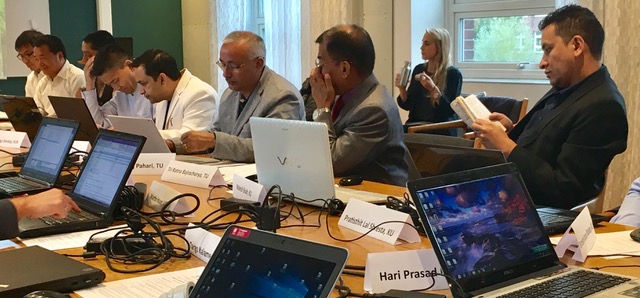
 Four years back, in 2015, Lund University was awarded a grant from the European Union Erasmus+ Programme, to fund a collaborative project entitled CIMCEB, an acronym for ”Curricula Development of Interdisciplinary Master Courses in Energy Efficient Building Design in Nepal and Bhutan”. The project, completed in June 2019 was run by a consortium with six partner universities – three in Europe (one in Estonia and one in Austria, besides Lund University), two in Nepal (Tribhuvan University and Kathmandu University) and finally the Royal University of Bhutan (RUB) or more precisely its College for Science and Technology in Phuntshoeling. Full information on the consortium web page.
Four years back, in 2015, Lund University was awarded a grant from the European Union Erasmus+ Programme, to fund a collaborative project entitled CIMCEB, an acronym for ”Curricula Development of Interdisciplinary Master Courses in Energy Efficient Building Design in Nepal and Bhutan”. The project, completed in June 2019 was run by a consortium with six partner universities – three in Europe (one in Estonia and one in Austria, besides Lund University), two in Nepal (Tribhuvan University and Kathmandu University) and finally the Royal University of Bhutan (RUB) or more precisely its College for Science and Technology in Phuntshoeling. Full information on the consortium web page.
Capacity building

The project primarily aimed at capacity building. In October 2017 the sixth consortium meeting was held in Lund. The NSAN editor Lars Eklund participated in the first session of the meeting and mingled with the Nepalese and Bhutanese representatives, and informed about his recent visit to the RUB College of Education in Samtse (read his report), as well as previous visits to RUB as well as Tribhuvan University in Kathmandu.
Through the CIMCEB project, the partner universities from Nepal and Bhutan has developed a new Master programme in the area of energy efficiency in buildings as well as supported existing Master programmes with development of laboratory facilities and establishment of new courses in order to encourage the possibilities to decrease the energy use in buildings and minimize the environmental impact.
Training courses
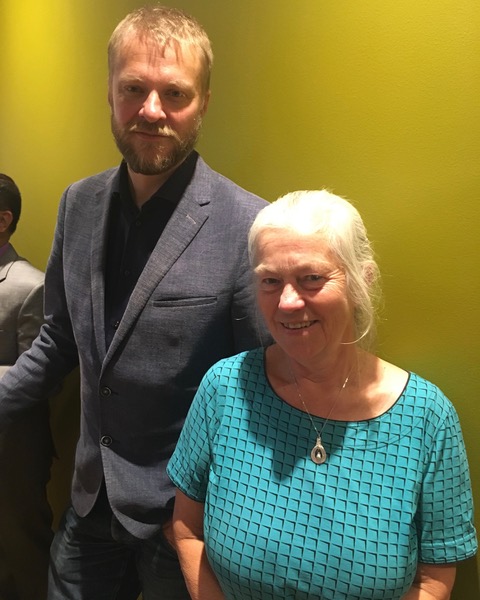 The master programme is supposed to include the development of appropriate laboratory components and field experiment tools based on interactive learning and teaching. The graduated masters on civil engineering will be prepared to meet the market needs and the building/energy efficiency codes of the Partner countries in order to establish sustainable energy development and efficient energy practices.
The master programme is supposed to include the development of appropriate laboratory components and field experiment tools based on interactive learning and teaching. The graduated masters on civil engineering will be prepared to meet the market needs and the building/energy efficiency codes of the Partner countries in order to establish sustainable energy development and efficient energy practices.
The CIMCEB project will also establish training courses for professional civil engineers and architects in the areas of applied energy for buildings as well as promote technological and scientific co-operation between universities and appropriate construction (and other) companies.
The impressive project is coordinated by the two Lund University researchers Henrik Davidsson, Associate senior lecturer at Department of Architecture and the Built Environment; and Elisabeth Kjellsson, Senior lecturer at Division of Building Physics. Photo above to the left.
 As part of the ongoing CIMCEB project, a Lund University masters student, Marianne Löwgren (photo to the right), spent time in Kathmandu during November-December 2017, working on a thesis project entitled ”Indoor Air Pollution, Passive Ventilation Strategies and Thermal Comfort in Nepal”. Marianne was also present at the consortium meeting in Lund to present her project plans.
As part of the ongoing CIMCEB project, a Lund University masters student, Marianne Löwgren (photo to the right), spent time in Kathmandu during November-December 2017, working on a thesis project entitled ”Indoor Air Pollution, Passive Ventilation Strategies and Thermal Comfort in Nepal”. Marianne was also present at the consortium meeting in Lund to present her project plans.
Long tradition of South Asia collaboration
The Department of Architecture and Built Environment in Lund has a long tradition of collaboration with South Asia. More information.
In the early 2000s, Prof. Subrata Chattopadhyay from Indian Institute of Technology at Kharagpur, India, was assigned to the department as guest lecturer, and for many years courses under Sida’s International Training Programmes were organised. Over 800 planners, architects, civil engineers and other professionals – many from India, Nepal and Bhutan – attended courses in courses such as International Construction Management (1990–2000), Architecture & Development/ Housing & Development (1990–2002), Architecture, Energy & Environment (1995–2003), Conservation & Management of Historic Buildings (2004–2005), Organized Self-help Housing (2002–2006), and Urban Housing Management. For many years, a postgraduate International training course on Conservation and Management of Historic Buildings was also organised, as a collaboration project betweeen the Department of Housing Development and Management and the Dept. of Architectural Conservation and Restoration, Lund University. The courses were initiated and financed by the Swedish International Development Cooperation Agency, Sida.
Lars Eklund
PS. The Bhutan/Nepal is completed. Now Elisabeth Kjellsson and her colleagues at Lund University plan for a new collaboration project with Asian partners, this time with three universities in Mongolia. Good luck.
Prison Diary by Kishorechandra Wangkhem
 In Outlook April 29 2019, Manipur journalist Kishorechandra Wangkhem, who was jailed, detained under the National Security Act (NSA) for critiziing the government, speaks out about detention, life in jail, democracy and personal freedom.He belongs to a small, unrecognised minority religion called Sanamahism, a pre-Hindu traditional ethnic stream. Barring a few, no civil organisation came out openly in condemnation of the government – ironical in a state known for the maximum number of civil organisations and mass movements against injustice. No Meira Paibis (women torch-bearers) were in sight outside his prison. None of that otherwise vocal element, students’ unions. Even the media fraternity disowned him. Read more…
In Outlook April 29 2019, Manipur journalist Kishorechandra Wangkhem, who was jailed, detained under the National Security Act (NSA) for critiziing the government, speaks out about detention, life in jail, democracy and personal freedom.He belongs to a small, unrecognised minority religion called Sanamahism, a pre-Hindu traditional ethnic stream. Barring a few, no civil organisation came out openly in condemnation of the government – ironical in a state known for the maximum number of civil organisations and mass movements against injustice. No Meira Paibis (women torch-bearers) were in sight outside his prison. None of that otherwise vocal element, students’ unions. Even the media fraternity disowned him. Read more…
Thanks for Karolinska-Aga Khan University long-standing collaboration
 The Division of Global Health at Karolinska Institutet Medical University in Stockholm focuses on health problems that are big in the world but small or non-existent in Sweden. Many know the division by its earlier acronym, IHCAR. It is part of the Department of Public Health Sciences. Since the start in 1984 it has developed extensive research in several fields within international health.
The Division of Global Health at Karolinska Institutet Medical University in Stockholm focuses on health problems that are big in the world but small or non-existent in Sweden. Many know the division by its earlier acronym, IHCAR. It is part of the Department of Public Health Sciences. Since the start in 1984 it has developed extensive research in several fields within international health.
This multidisciplinary division pursues research and education in collaboration with researchers in Europe, North and South America, Asia and Africa. Through the experience of collaboration with global partners and stakeholders, the division aims at being a resource centre at the Karolinska Institutet, recognized for its comprehension of global health issues. Extensive collaboration exists within Karolinska Institutet and the division is an active stakeholder in the Karolinska International Research and Training (KIRT) Program and the Centre for Global Health (KICGH). Read about The history of 60 years of KI research collaboration with Pakistan and India
IHCAR has practiced the successful sandwich PhD system for many years, that has resulted in a large number of theses by PhD candidates from among other third world countries, India, Pakistan and Bangladesh. A special relationship exists between KI and Aga Khan University (AKU) in Karachi, Pakistan, with research and research training collaboration going on since 1992. Nine of the faculty at AKU Karachi currently have PhDs from KI, all have returned to Karachi and three of them hold interim chairs. Read Bo Lindblad’s 2005 report on collaboration between KI and Aga Khan University.
PhDs at Karolinska Institutet has this far been achieved by 9 AKU faculty in a ”sandwich system”. Seven of these are still full time faculty at AKU. They are:
1. Zulfiqar Bhutta, Chair Maternal and Child Health
2. Junaid Razzak, Chair Medical Emergency
3. Fauziah Rabbani, Chair Community Health Sciences
4. Shahab Abid, Head Gastroenterology unit, Medicine
5. Farid-ul-Hasnain, Community Health Sciences
6. Tashfeen Ahmad, Orthopedic unit, Surgery
7. Tazeen Said Ali, School of Nursing
Karolinska Institutet Medical University in Stockholm has been involved in collaboration projects with Pakistan, and especially withAga Khan University (AKU) in Karachi, since the 1950’s. Professor Emeritus Bo Lindblad at IHCAR has been , .instrumental in much of these projects. Read his report on half a century of Kl-AKU collaboration
In March 2018, Aga Khan University sent an official letter thanking the President, Members of the Faculty and Members of the Administration of Kl for their interest in, support of and contribution to the old and still ongoing collaboration with Karolinska Institutet). In the document, it is mentioned that the collaboration has created research leaders, research groups, besides good will for Sweden and Kl and increased the research capacity within low-income areas of South Asia and East Africa. The PhD theses have been defended at Kl and the papers in them published. A list of total publications from the teams involved is available at AKU and a summary of the projects with results is being prepared at AKU.
Linnaeus Palme grant for Sweden-Bhutan exchange programme now running
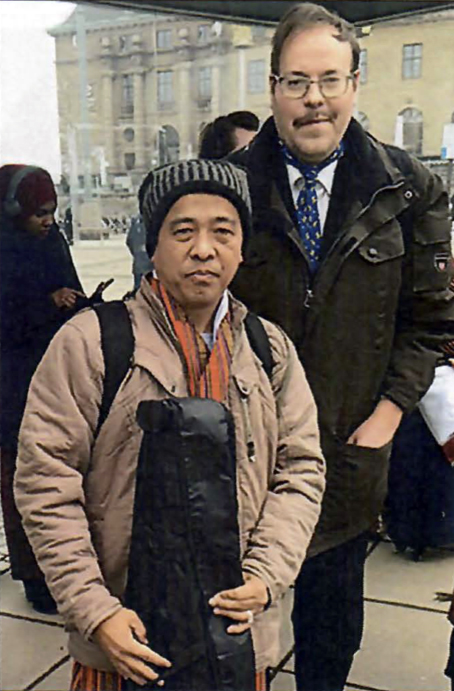 On 22 May 2018, the Swedish Council for Higher Education decided to award SEK 523 000 as a Linnaeus Palme Exchange Programme grant to the Department of Science, Environment and Society (NMS) at the University of Malmö for its new collaboration programme with Samtse College of Education (SCE) at the Royal University of Bhutan (RUB) during 2018. The authority is pleased to see that the application maintains a high quality, due to the work and dedication of the collaborating partners leading to achievement of our common goal of a higher quality of education. The project includes 12 approved numer of teacher and student mobilities.
On 22 May 2018, the Swedish Council for Higher Education decided to award SEK 523 000 as a Linnaeus Palme Exchange Programme grant to the Department of Science, Environment and Society (NMS) at the University of Malmö for its new collaboration programme with Samtse College of Education (SCE) at the Royal University of Bhutan (RUB) during 2018. The authority is pleased to see that the application maintains a high quality, due to the work and dedication of the collaborating partners leading to achievement of our common goal of a higher quality of education. The project includes 12 approved numer of teacher and student mobilities.
The aim of the Sweden-Bhutan project is to develop and support a more culturally responsive teaching and learning in mathematicsand mathematics teacher education in the Swedish and Bhutan school contexts. The new collaboration was facilitated by the NSAN editor Lars Eklund during a May 2017 visit to Samtse, when he discussed with Senior SCE Lecturer Purna Badadur Subba and Dr. Johan Westman, Swedish ethnomusicologist working at SCE since 2016, the possibility to find collaborating partners in Swedenon the isue of Ethnomathematics. Read Lars Eklund’s report from Samtse College of Education .
At Malmo University, Associate professor Annica Andersson happened to be working on Etnomathematics with a strong international network with scholars at teacher education institutions and universities in different parts of the world. Her thesis and research has been based on critical mathematical and ethnomathematical research. Together with Lena Andersson, senior lecturer and the international coordinator at the department, and with a background from the ITP/Sida programme”Child Rights, Classroom and School Management”, they form the Swedish coordination team.
In early February 2018, Prof. Subba and Dr. Westman from Samtse College of Education visited Malmö University and their counterparts at Malmo University to plan for the coming exchange programme. In Malmo, they also had a seminar on Bhutanese folk music at Lund University’s Faculty of Fine and Performing Art – located in Malm6. Besides they spent a few days in Gothenburg and Borås. Photo to the right from Gothenburg.
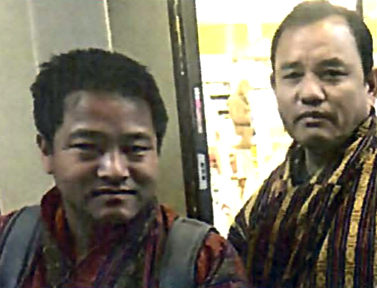
By chance, another group of four Bhutanese school teachers also visited Sweden and Gothenburg during the same period. It so happened that Båtsmansskolan in Härryda, outside Gothenburg, had successfully applied for another Swedish government funded exchange programme, the Atlas programme, for a collaboration with Samtse Lower Secondary School -located in the same small Bhutanese town as the College of Education.Atlas is a programme for schools and other educational institutions interested in global networking and practical training exchanges. This programme is also administered by the Swedish Council for Higher Education. More information .
The NSAN editor also played a certain role in creating the initial contact between the two schools in Samtse and Härryda, and Lars was therefore invited to meet the entire Bhutanese group in Gothenburg on Sunday 11 February .
In June 2018, the final approval of grant was decided upon, for a period of 8 years. This partnership programme is in between SCE at RUB, Bhutan and NMS at Malmö University ,Sweden. Purna and Johan expressed their sincere and heartfelt thanks to everyone whose support was crucial ( and received) for achieving this grant, including Lars Eklund.
